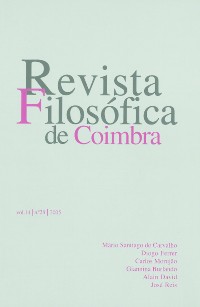Please use this identifier to cite or link to this item:
https://hdl.handle.net/10316.2/34183| Title: | A Logica Modernorum: lógica e filosofia da linguagem na Escolástica dos séculos XIII e XIV | Authors: | Morujão, Carlos | Issue Date: | 2005 | Publisher: | Faculdade de Letras da Universidade de Coimbra, Instituto de Estudos Filosóficos | Abstract: | This essay approaches two of the main contributions of mediaeval logic to the history of logic and the philosophy of language: the doctrine of suppositio and that of consequentiae. The aim here is to demonstrate that although mediaeval logic depended on the syntactical structure of Latin , authors managed to reach a high level of understanding regarding strictly logical problems, not only anticipating some theories from modern semantics , but also predicate calculus and sentential calculus. This research, especially after the 13th century, developed in complete isolation from Aristotelian logic, particularly its doctrines of syllogism and declarative sentence. It also revealed enormous originality and creativity regardless of the contribution ( which was in any case reduced) that stoic logic known from the works of Cicero and Boethius may have had. | URI: | https://hdl.handle.net/10316.2/34183 | ISSN: | 0872-0851 |
| Appears in Collections: | Revista Filosófica de Coimbra |
Files in This Item:
| File | Description | Size | Format | |
|---|---|---|---|---|
| rfc28_artigo3.pdf | 8.21 MB | Adobe PDF |  |
Items in DSpace are protected by copyright, with all rights reserved, unless otherwise indicated.
